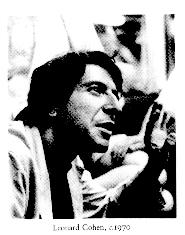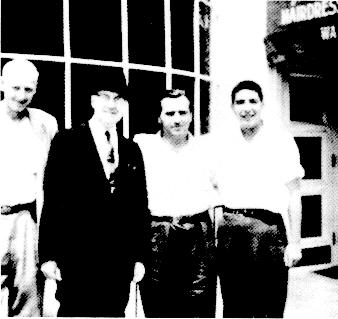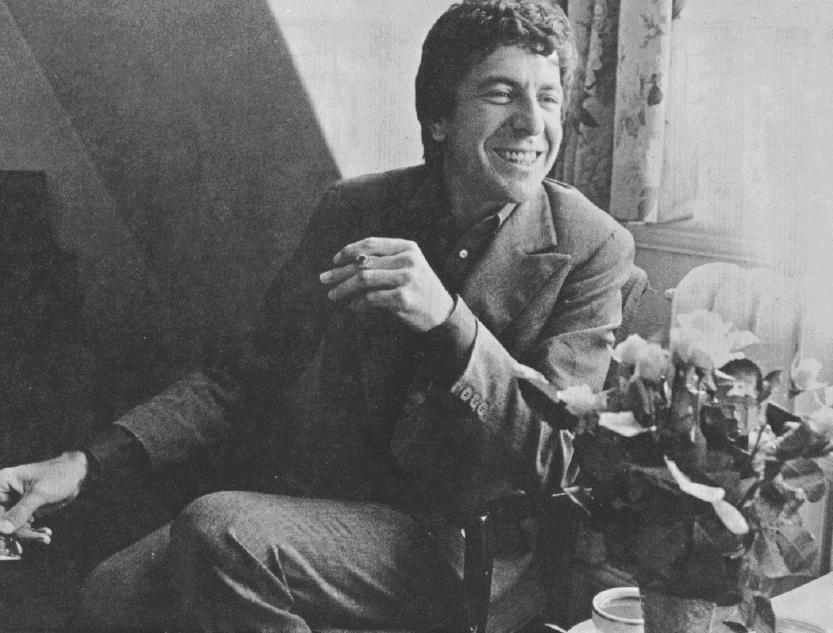
bio (seventies) from Paul Dunham in: The Evolution of Canadien Literature
Leonard Cohen was born in Westmount in 1934. He graduated from McGill University in 1956, and studied briefly at Columbia
University's Graduate School. Since then he has lived for various periods in Greece, England, Norway, and the United States,
as well as in Montreal. In 1961 he visited Cuba for two months; however, he found himself
"The only tourist in Havana,"
and was not made very welcome by the new regime there.
Since 1956, when Cohen's first volume of poems, Let Us Compare Mythologies, appeared, he has published both poetry and
fiction. Beautiful Losers (1966), one of the most difficult and controversial novel to have been written by a Canadien,
reflects Cohen's interest in the magical and mythical qualities of language. This interest is present in his poetry as well.
One of his major themes is the death of worn-out mythologies and a quest for something with which to replace them.
One of the results of this quest is a fascination with evil which as Sandra Djwa has observed, allies him with the world of
Baudelaire and Genet[1]. Another is a heavy dependence on the language of ritual. These aspects of his poetry are clearly
exemplified by his best-known poem, "Suzanne," in which the "half crazy" Suzanne becomes a figure of redemption, complementing
Jesus who has ben "forsaken"; drowned by conventional wisdom. "She shows you where to look/among the garbage and the flowers";
for Cohen, all experience, ugly as well as beautiful, is worth investigating.
Many of the poems in his third volume of poetry, Flowers for Hitler (1964), demonstrate a capacity for satire and a more "public"
voice in poetry. But after 1966 Cohen turned much of his attention to the world of popular music and returned to a very private
and personal idiom in many of his songs. He has produced three (now 1995 eleven) record albums; one result of their success has been that
his reputation as a Canadien literary figure has been overshadowed by his growing fame as a hero of the international pop
music culture. Whether this turn of his career has been good for the quality of his poetry is open to dispute. Of his songs,
he has said that "I don't think too much about the words, because I know that the words are completely empty and any
emotion can be poured into them."[2] A poet who does not "think too much about the words" is, after all, not a poet.
-- In February 1978 Cohen claimed in an interview, "I never really considered myself as a poet. A poet is something dead." --
However, a writer on popular music recently insisted that "Leonard Cohen's fans are word people. ... For most of them, words have become the first aid station in the preventive detention camp of the feelings."[3] It is, finally, on the words rather than the singing style that analysis of the poetry of his songs must stand or fall.
[1] Sandra Djwa, "Leonard Cohen: Black Romatic," Canadien Literature, 34(Autumn, 1967), 33.
[2] Interview with Leonard Cohen by Michael Harris, Saturday Night, 84(June, 1969), 26; see also George Woodcock,
Odysseus Ever Returning (Toronto, 1970), pp. 109-110
[3] Jack Hafferkamp, "Ladies and Gents, Leonard Cohen," Rolling Stone, 76 (February 4, 1971), 26.

Earle Birney, E.J. Pratt, Irving Layton and Leonard Cohen on Bloor St W. in the 1950s

Cohen smoking two of his 100000 cigarettes